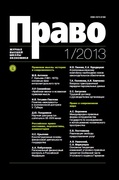Понятие «вежливость» в коллизионной доктрине Ульрика Губера
Аннотация
Статья посвящена исследованию понятия «вежливость», разработанного знаменитым юристом XVII в. Ульрихом Губером (1636–1694). Этот автор является наиболее типичным выразителем голландской теории конфликтного права. В работах Губера самым рельефным образом отражена доктрина международной вежливости, составляющая основу голландской школы статутов. Доктрина международной вежливости представляет собой один из наиболее важных и одновременно с этим наименее осмысленных канонов права, используемых судами при разрешении споров, связанных с иностранным правопорядком. Трудность определения международной вежливости частично объясняется тем, что научные исследования в большинстве своем не затрагивают исторический аспект коллизионного права, в рамках которого формировалась и развивалась доктрина международной вежливости. Эта проблема не потеряла актуальности и в наше время, что обуславливает необходимость ее научного изучения. Доктрина вежливости в том виде, в котором мы привыкли ее воспринимать, возникла в XVII веке одновременно с появлением национальных государств в Европе. Ее основателями выступили юристы, представлявшие высокоразвитую голландскую буржуазию. Автором теории вежливости является Павел Вут, но знаменитой эту теорию сделал Ульрих Губер. Он первым использовал фразу «comitas gentium», чтобы описать правомерность применения иностранного права, и настоящая история международной вежливости начинается с него. В своих аксиомах Губер обозначил наиболее важную проблему коллизионного права: каким образом иностранное право может применяться в рамках национальной юрисдикции, если оно носит строго территориальный характер? По существу, этот ученый стал первым автором, который попытался прояснить наиболее спорный и неясный момент – почему иностранный суверен в своем государстве разрешает действие иностранного права. В теории Губера вежливость выступала и теоретическим, и правовым обоснованием при разрешении проблем коллизионного права – суд в одной стране мог применять право другой страны, основываясь на международной вежливости. В статье делается вывод, что практически все аксиомы Губера вошли в современную доктрину и судебную практику (особенно в странах общего права). Губера можно считать основоположником теории национальной природы коллизионных норм и одновременно – основоположником международно-правовой теории МЧП.
Copyright (c) 2013 Право. Журнал Высшей школы экономики

Это произведение доступно по лицензии Creative Commons «Attribution-ShareAlike» («Атрибуция — На тех же условиях») 4.0 Всемирная.


















